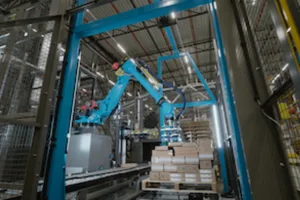Degree apprenticeships target skills gap
Logistics businesses should consider investing in training and upskilling to ensure they retain talent and protect the long-term future of their operations, argues Caroline Evans.

A SURVEY conducted by CILT found that 54% of logistics businesses expect to see skills shortages by 2024. There is a plethora of reasons why, with some of them pointing to the rapid development of technology changing the way the industry works, the loss of workers due to Brexit, the demand in logistics increasing with eCommerce rapidly developing and that the sector is known for having an older than average workforce.
Unfortunately, the challenges don’t stop there. A career in logistics isn’t a career path that everyone finds attractive – some assume it offers a small pay cheque, a lot of heavy labour and stress, and for some roles, the time away from family and friends makes it less appealing. Offering incentives to learn and help workers move up the career ladder within logistics, however, is an effective way to get people to stay within the sector, while also closing the widening skills gap.
The power of upskilling
To try to tackle the ongoing skill shortages within the workforce, the UK Government has launched its ‘returnships’ initiative to encourage adults over the age of 50 to get back into work and embark on exciting new career ventures. While this has been met with apprehension by some, for the logistics sector, it could offer opportunities to help close the skills gap.
Between 2019 and 2021, there was a 40% increase in the share of postings offering on-the-job training in the logistics sector. On top of this, there was a 45% increase in the job postings offering career advancement opportunities. This points toward training and career development being a key attraction when trying to hire people to work in logistics.
Interestingly, research also showed there was a 333% increase in postings requiring no previous experience; reflecting how companies are increasingly willing to fill their open jobs with entry level applicants or attract workers from other industries looking to make a career switch. This, again, is desirable, as even though some may see working in logistics as a “stop-gap” career, it also means there is potential to train such workers so they can advance their career in logistics and stay within the industry.
Arden University’s own research has shown that adults struggle with the notion of reskilling post-school. We found that lack of confidence is one of the main factors preventing adults from exploring a new industry or job and that less than half (44%) of people feel there is adequate support and opportunities to change career in the UK.
People are struggling to find the links between their current skills and ones needed for future roles – and the older generation don’t know how relevant their qualifications are, or if they need updating. Worryingly, our research also unveiled that, as people become older and gain more experience, they feel even less supported in changing or developing their career. The paradox of those with the greatest experience and depth of work-based capability being unsupported to find their place in a changing employment market has the worrying potential to push great talent out of organisations when exactly the opposite is needed.
How degree apprenticeships can play a part
Offering degree apprenticeships for employees is a great option for retraining and upskilling, while ensuring commercial benefit for employers. Just under half of those who start on apprenticeships are aged 25 and over and there are about 29,000 people aged 45 to 59 in training; with the average age of a haulage driver in the UK being 57 years old and 81% of managers in the industry being over 45 years old, upskilling and retraining could provide a large talent pool for the logistics industry to tap into.
This talent could include those who may have taken a break from the industry but want to return, bringing their previous experience with them or those who are looking to change careers and will provide a fresh outlook.
As the logistics sector is rapidly changing with the pace of technological advancements, the skills required also change, that’s why degree apprenticeship programmes through a partner such as Arden University can play an important role in ensuring employees have access to bespoke learning and development for their roles and industry. Our programmes are developed to meet the specific needs of the businesses and organisations we work with to make sure they deliver commercial impact.
Degree apprenticeships also ensure those in senior roles can advance in their career, while on the job. This opens doors for those who previously did not have access to higher education and, therefore, did not have the chance to gain a degree or post-grad qualification, helping to drive a diverse workforce through the managerial hierarchy.
While the challenges facing skills and labour in logistics won’t be solved overnight, by focusing on investing in the development and training of those currently in the sector and showing the learning and development opportunities available in the career to those who are not, businesses can start to ensure they retain talent, attract new recruits, and ultimately, help future-proof their operations.
Caroline Evans, corporate strategy director, Arden University
For more information, visit https://arden.ac.uk/for-business/apprenticeships/for-students






